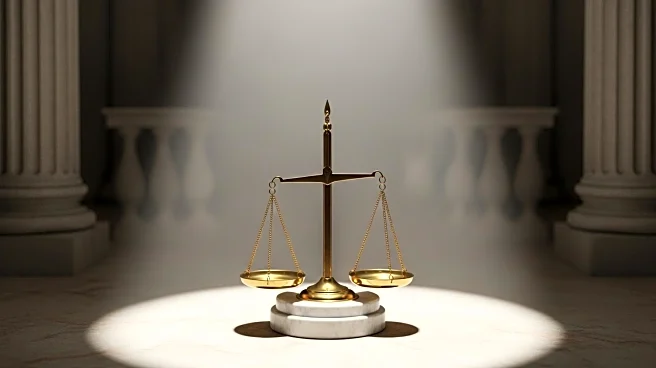What is the story about?
What's Happening?
Justice Amy Coney Barrett has been facing significant public protests and threats since her appointment to the Supreme Court. These protests intensified following the Court's decision to overturn Roe v. Wade, a landmark ruling on abortion rights. Barrett, who replaced Justice Ruth Bader Ginsburg, has been a focal point for criticism due to her conservative stance and her role in pivotal decisions. Despite the threats, including an assassination attempt on Justice Brett Kavanaugh, Barrett remains unfazed, emphasizing her commitment to not living in fear. She continues to advocate for a judicial approach that prioritizes constitutional originalism, a method she adopted from her mentor, Justice Antonin Scalia. Barrett's new book, 'Listening to the Law,' aims to correct public misconceptions about the Supreme Court's political neutrality and its interpretative philosophies.
Why It's Important?
The ongoing protests and threats against Justice Barrett highlight the deep divisions within American society regarding the Supreme Court's role and decisions. Barrett's stance and the Court's rulings have significant implications for U.S. public policy, particularly in areas like abortion rights and free speech. Her approach to law, focusing on originalism, influences how future cases might be decided, affecting millions of Americans. The threats against justices underscore the heightened tensions surrounding judicial decisions and the potential impact on the safety and functioning of the judiciary. Barrett's resilience and commitment to her judicial philosophy may shape the Court's direction and its perception by the public.
What's Next?
Justice Barrett and the Supreme Court are set to face more controversial cases, including those related to gun rights, voting rights, and campaign finance reform. The Court's decisions in these areas will likely continue to provoke public debate and scrutiny. Barrett's book tour and public appearances aim to educate the public on the Court's processes and philosophies, potentially influencing public opinion. The Court's handling of emergency appeals, particularly those involving President Trump's policies, will be closely watched, as they could set precedents for future administrations. Barrett's approach to these cases will be critical in determining the Court's stance on executive power and constitutional interpretation.
Beyond the Headlines
Justice Barrett's experiences reflect broader societal issues, such as the intersection of personal beliefs and professional responsibilities. Her Catholic faith and conservative views have been points of contention, raising questions about the influence of personal ideology on judicial decisions. Barrett's emphasis on emotional control and analytical decision-making offers insights into the pressures faced by public figures in polarized environments. Her journey from a non-Ivy League background to the Supreme Court challenges stereotypes and highlights the diverse paths to judicial leadership. The ongoing discourse around the Court's decisions may lead to long-term shifts in public trust and expectations of the judiciary.















